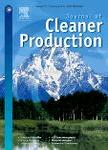版权所有:内蒙古大学图书馆 技术提供:维普资讯• 智图
内蒙古自治区呼和浩特市赛罕区大学西街235号 邮编: 010021

作者机构:Wageningen Univ Operat Res & Logist Hollandseweg 1 NL-6706 KN Wageningen Netherlands
出 版 物:《JOURNAL OF CLEANER PRODUCTION》 (清洁器生产杂志)
年 卷 期:2019年第216卷
页 面:249-256页
核心收录:
学科分类:0830[工学-环境科学与工程(可授工学、理学、农学学位)] 08[工学]
基 金:TI Food and Nutrition a public private partnership on pre-competitive research in food and nutrition
主 题:Multi objective programming Green supply chain management Sustainability Scenario based two-stage stochastic programming
摘 要:Due to the increasing awareness of climate change, depletion of natural resources, and increasing world population, companies in the agri-food sector need to redesign their existing supply chains and take into account both the economic and environmental impact of their operations. In practice not all the required information is available in advance due to various sources of uncertainty in agri-food supply chains. In this research a multi-objective two-stage stochastic programming model is proposed to analyse and evaluate the economic and environmental impacts to account for uncertainty in agri-food supply chains. A mushroom supply chain in the Netherlands is presented as an illustrative case study. Optimal production planning decisions calculated with a two-stage stochastic programming model are compared with the results of an equivalent deterministic model. The results of the optimizations show that accounting for stochasticity in important model parameters can reduce the difference between expected and realized economic performance by approximately 4% on average. Moreover, this paper demonstrates that including stochastic model parameters can reduce the environmental impact without compromising the current economic performance. Given the assumptions in the setup of the case study and the available information, it is concluded that applying a 2-stage stochastic programming approach for production planning decisions can lead to improved economic and environmental performance in an agri-food supply chain. New findings in real-life case studies are needed to get profound insights and understanding on the impact of uncertainty on production planning decisions in sustainable agri-food supply chains. (C) 2019 Elsevier Ltd. All rights reserved.